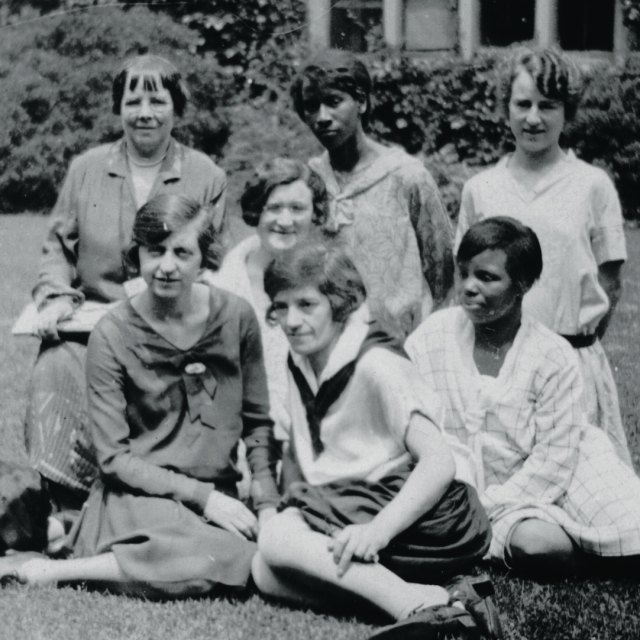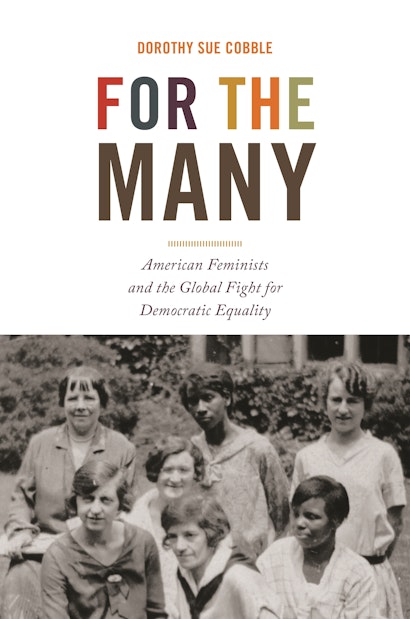The Equal Rights Amendment, introduced in 1923, has resurfaced in 2021 after a long sleep. Whether it becomes part of the US Constitution is anyone’s guess, as is the practical effect of such a change given the conservative tilt of the Supreme Court. Still, for many women’s rights supporters, there’s considerable anticipation about the ERA becoming the law of the land. By banning discrimination “on account of sex,” the thinking goes, the ERA would finally guarantee women’s equality.
But would it?
The women I write about in For the Many answered no. They sought to end unjust discrimination “on account of sex”—not always a popular stance in their day. But in their view achieving full equality for women meant fighting for more than women’s equal legal rights with men. Broad social reform was needed, they believed, if all women (and men) were to thrive. Power, wealth, and recognition must be redistributed; political and economic autocracy dislodged; and the cultural devaluation of the social and of caring labor reversed.
I call these women “full rights” feminists and claim their capacious approach to social reform the majority tradition of twentieth-century US women’s politics. The movement for full rights included famous women like Eleanor Roosevelt, Mary McLeod Bethune, and Frances Perkins. But lesser-known women such as Rose Schneiderman, Maida Springer, and Esther Peterson, to name a few, were also indispensable to its achievements. Spanning multiple generations, full rights feminism emerged as a powerful political force in the early twentieth century as the struggle for democracy surged worldwide. It flourished from the 1930s to the 1970s, weathered the conservative assaults of the late twentieth century, and lives on today as female-led social movements and political parties around the world demand inclusion and equality for all.
This surprisingly robust tradition of women’s politics offers a rich history on which to draw as America seeks to rebuild on a more humane and just basis.
We no longer believe, as Richard Hofstadter wrote in 1948, that men made the American political tradition. But “the power and presence” of women in public life remains underestimated, as historian Mary Beard judged long ago, and the social-democratic traditions of women’s politics marginalized and misunderstood. All too often, US feminism is flattened to an anemic, hyper-individualist caricature labeled “liberal feminism.” When the US veered rightward in the 1980s and 1990s, a neo-liberal version of US feminism gained traction. But neo-liberal feminism was hardly the dominant voice of US feminism historically. Other versions of US feminism—ones committed to the rights of women, workers, and the poor—held considerable sway.
As For the Many reveals, over the long twentieth century, a multi-racial, cross-class network of US women and their allies moved the nation and the world toward social democracy. They upended conventional conservative thinking about poverty, gender, race, and nation; they redesigned government policies to ensure greater economic and social justice; and they invented new forms of workplace democracy and civic participation.
Full rights feminists launched the first international federation of women workers in 1919 and shaped the world’s first international labor standards. They insisted on women’s rights to paid maternity leave as a fundamental social right and called for workplace hour and safety regulations for men as well as women. From the 1930s to the 1960s, US social democratic women were in the forefront of the worldwide drive for fair pay, social welfare, and human rights for all. They pushed America to honor its democratic principles at home and abroad, working as government insiders and as grassroots activists.
Frances Perkins’ predecessor as US Secretary of Labor thought her 1933 appointment to the US cabinet a joke. He soon learned otherwise. A brilliant, unflappable politician, she had him and his office furnishings carted away. The old labor department of cuspidors and cigars, a New Yorker writer marveled, was no more. Perkins did not get everything she wanted, but by the end of the decade, many of the items on her list—social security, worker rights to organize and bargain collectively, national wage floors and hour ceilings, and an end to child labor—had been enacted. In the 1940s and 1950s, she and others in her circle led the International Labor Organization in its worldwide promotion of a higher standard of life for all through regulated economies and workplaces.
Yet as American feminism helped shape the world, so too did the world shape American feminism. Many prominent social democratic women moved to the United States from other nations: Poland’s Rose Schneiderman, Australia’s Alice Henry, Panama’s Maida Springer, Germany’s Toni Sender, and Sweden’s Mary Anderson. Just as many, native-born and foreign-born, traveled abroad frequently, forged lasting cross-border friendships, and, at times, spent years living outside America. Their transnational networks and their extended sojourns in Europe, Latin America, Africa, Asia, and the Middle East molded the movements in which they participated and the policies they advocated.
A bright thread of US-India exchange runs through the pages of For the Many—from the remarkable friendship of Irish-American labor organizer Leonora O’Reilly and Indian educator Parvatibai Athavale in the World War I era to the mid-century bonds between South Carolina-born Mary McLeod Bethune and Indian independence leader Vijaya Lakshmi Pandit to the youthful wanderings of Gloria Steinem with the Gandhian “land gift” movement in 1950s India. What she learned in India during those two life-changing years became the core of her political philosophy as she and others recast feminism in the 1970s.
The women in For the Many survived war, fascism, and economic collapse. They, like us, despaired as the muddy waters of hate, militarism, and selfishness rose around them. And they too pondered the seemingly intractable hierarchies of race, nation, sex, and culture. The solutions they sought and enacted, though partial, are well worth reclaiming.
Dorothy Sue Cobble is Distinguished Professor of History and Labor Studies Emerita at Rutgers University. Her many books include The Sex of Class, Feminism Unfinished, and The Other Women’s Movement (Princeton). Website www.dorothysuecobble.com

